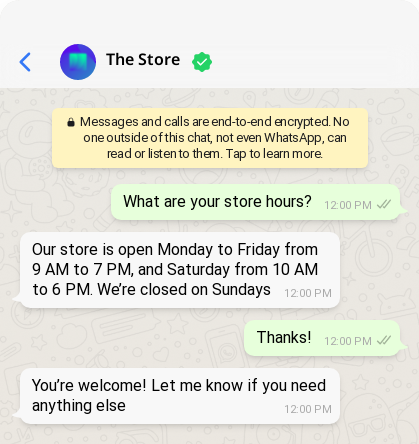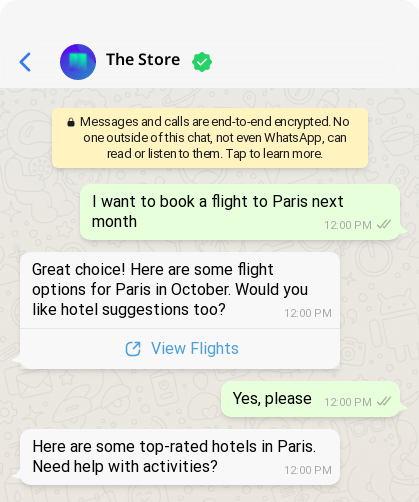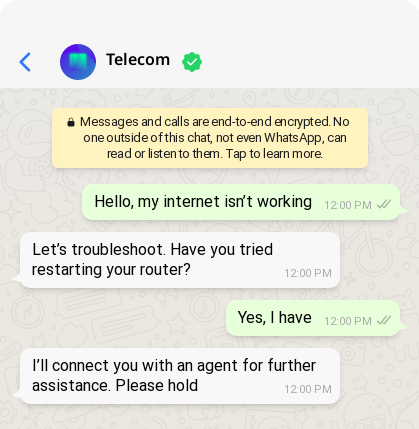Businesses today are in a race to meet the ever-evolving expectations of the digital customer. Imagine stepping into a world where every digital interaction is personalized, efficient, and seamlessly integrated into your daily life.
Positioned at the intersection of technology and customer needs, chatbots—categorized into rule-based, AI-powered, and customer service varieties—are leading a transformative wave across various industries.
Chatbots integrated with messaging platforms like WhatsApp are revolutionizing customer engagement by offering real-time, personalized interactions directly within an app millions of people use daily. WhatsApp chatbots can manage everything from answering frequently asked questions to processing orders and providing instant customer support around the clock. The ability to handle rich media, such as images, videos, and documents, makes these chatbots even more versatile, allowing businesses to send product demos, order confirmations, or troubleshooting guides in seconds.
Also, WhatsApp chatbots can facilitate two-way conversations and send proactive notifications like shipping updates, appointment reminders, or promotional offers, creating a seamless and consistent customer experience.
By leveraging WhatsApp’s secure and trusted platform, businesses can build stronger, more meaningful customer relationships, enhance satisfaction, and drive long-term loyalty. This instant, on-demand support level sets a new standard for customer service, making WhatsApp chatbots an essential tool for businesses looking to elevate their digital engagement strategies.
Understanding the Core Types of Chatbots
Rule-Based Chatbots: These chatbots operate on predefined rules and scripts. They respond to customer inquiries based on established pathways that trigger specific responses. Rule-based chatbots are ideal for handling frequently asked questions and offer quick and consistent answers to straightforward queries.
Their main strength lies in their reliability and the ability to provide immediate solutions within their programmed scope.

AI-Powered Chatbots: AI-powered chatbots represent a leap forward in digital interaction and are equipped with natural language processing and machine learning capabilities. Unlike their rule-based counterparts, these chatbots can understand and interpret the nuances of human language, allowing them to engage in more complex and conversational interactions.
They learn from each interaction, continuously improving their responses to meet customer needs. This makes them well-suited for tasks requiring deeper understanding and personalization.

Customer Service Chatbots: Specifically designed to enhance the customer service experience, these chatbots are programmed to address a wide range of customer queries and issues. They combine elements of rule-based and AI-powered technologies to provide timely and efficient support.
Whether navigating inquiries, solving problems, or connecting customers with human agents when necessary, customer service chatbots are essential in streamlining the customer support process and ensuring satisfaction.

Transformative Chatbot Applications Across Industries
Financial Services: Chatbots are redefining conversational banking, taking on roles from handling account inquiries and processing claims to assisting with loan applications and balance checks. This shift boosts customer engagement and enhances operational efficiency within the financial sector.
Government: In government services, chatbots facilitate civic query handling such as tax queries, providing enrollment information, scheduling health appointments, aiding security reporting, and streamlining license renewals. This digital facilitation serves to elevate public satisfaction and accessibility to crucial services.
Hospitality: Chatbots in hospitality transform guest inquiry response, managing everything from room reservations and tour bookings to event ticketing and collecting guest feedback. This level of digital interaction ensures guests receive personalized and attentive service, enriching their overall experience.
Transportation: Within the transportation sector, chatbots serve as comprehensive traveler info hubs, offering services like ticket booking, providing route information, managing customer service inquiries, and assisting with lost and found items. This ensures a smoother, more enjoyable travel experience for passengers.
Retail: Chatbots are revolutionizing the retail experience by offering instant consumer support information on product availability, prescription refills, store hours, and more. They bring convenience and personalization to the shopping experience, making it more engaging and tailored to the consumer’s needs.
Embracing the Future with Chatbots
The journey from simple scripted interactions to sophisticated, AI-enhanced conversations marks a pivotal shift in how businesses connect with customers. Chatbots have become key tools forging more robust, meaningful customer relationships across various industries.
Transform the way you interact with your customers. Discover the difference with Messangi, start automating your conversations today and propel your business into the future of digital engagement.





